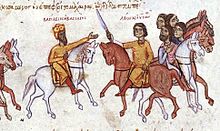Leo VI (Byzantium)



Leo VI , called the sage or the philosopher ( Middle Greek Λέων ΣΤʹ ὁ Σοφός Leon VI. o Sophos or ὁ Φιλόσοφος o Philosophos ; * September 19, 866 probably in Constantinople ; † May 11, 912 ibid) was Byzantine emperor from 886 to 912. He came from from the Macedonian dynasty .
Life
Leo's mother was Eudokia Ingerina , the former lover of Emperor Michael III. before she married the later Emperor Basil I during Michael's lifetime . However, the relationship between father and son was very tense. It is sometimes even assumed that Leo was actually the son of Michael III. was, but that must remain controversial. Although Leo was also made co-emperor in 870, his older half-brother Constantine was considered the first candidate for the line of succession until his untimely death in 879. In 883 Leo was involved in a conspiracy against Basil and was therefore imprisoned until 886. Basil had entrusted Leo to the patriarch Photios for training . After the emperor's death, Leo ascended the throne in 886 and ruled with his brother Alexander , although the actual power lay with Leo.
In terms of foreign policy, Leo, who unnecessarily provoked a war against the Bulgarians , suffered several military defeats. In 896 the Byzantines were decisively defeated. Thereupon Leo made peace with the Bulgarians; it is also possible that he had to pay tribute. In 907 Constantinople was attacked by the Kievan Rus , who wanted to obtain advantageous trading rights with the empire. In 911 a trade agreement was probably concluded, but both processes, the attack and the conclusion of the contract, are not undisputed in research, as the source is an Old Russian text from the 12th century.
He also suffered losses against the Arabs : In 902 Taormina was lost in Sicily , which had consequences for the control of the Byzantine waters by its own fleet. Several Byzantine cities were also attacked. In 911 the Byzantines undertook a large-scale invasion of Crete , but it failed. Shortly after this defeat, Leo fell ill and died. Since his son Constantine was still a child, Leo's brother and nominal co-regent Alexander became the actual emperor.
Leo owes his nickname to his education and his promotion of the arts (see also Macedonian Renaissance ). He completed the work on the Basiliká , the Greek translation and updating of the laws of Emperor Justinian I , which Basilica had begun during his reign. Around 900 he wrote the first definition of (military) logistics known today as part of his work Summarized Confrontation of the Art of War , which has become known as the Leonin Military Institute .
With his many marriages, Leo caused a minor scandal that led to the so-called tetragamy dispute . His first wife, whom Leo had to marry, died in 897; he then married Zoë Zautzina, daughter of his advisor Stylianos Zautzes , who also died in 899. After the second marriage, Leo created the title Basilopator ( father of the emperor , see Offices and titles in the Byzantine Empire ) for his father-in-law. After Zoe's death he was forbidden to marry a third time, but he married again. However, this wife died in 901. Instead of a fourth marriage, which according to the Patriarch Nicholas would have been an even greater sin than the third, Leo preferred to take Zoe Karbonopsina as his lover. He was allowed to marry her when she gave birth to a son in 904, but on the condition that he did not legitimize her as empress.
literature
- Ralph-Johannes Lilie , Claudia Ludwig, Thomas Pratsch, Beate Zielke, Harald Bichlmeier, Bettina Krönung, Daniel Föller, Alexander Beihammer , Günter Prinzing : Prosopography of the Middle Byzantine Period . 2nd department: (867-1025). Volume 4: Landenolfus (# 24269) - Niketas (# 25701). Created after preliminary work by F. Winkelmann . Published by the Berlin-Brandenburg Academy of Sciences. De Gruyter, Berlin 2013, ISBN 978-3-11-016669-9 , pp. 25-43 No. 24311.
- Shaun Tougher: The Reign of Leo VI. (886-912). Politics and People (= The Medieval Mediterranean. Vol. 15). Brill, Leiden u. a. 1997, ISBN 90-04-10811-4 .
- Warren Treadgold : The Middle Byzantine Historians . Palgrave Macmillan, Basingstoke 2013, pp. 121ff.
Web links
- Literature by and about Leo VI. in the catalog of the German National Library
Remarks
- ↑ Shaun Tougher: The Reign of Leo VI. (886-912). Suffering u. a. 1997, p. 1, note 1 and p. 42 ff.
- ↑ For general information on the military conflicts, see Shaun Tougher: The Reign of Leo VI. (886-912). Suffering u. a. 1997, p. 164ff.
- ↑ See Shaun Tougher: The Reign of Leo VI. (886-912). Suffering u. a. 1997, p. 180. On mutual relations: ibid., P. 172ff.
- ↑ Shaun Tougher: The Reign of Leo VI. (886-912). Suffering u. a. 1997, p. 20.
- ↑ See Shaun Tougher: The Reign of Leo VI. (886-912). Suffering u. a. 1997, p. 40f.
- ↑ Shaun Tougher: The Reign of Leo VI. (886-912). Suffering u. a. 1997, p. 192.
- ↑ Shaun Tougher: The Reign of Leo VI. (886-912). Suffering u. a. 1997, p. 110ff.
- ↑ Shaun Tougher: The Reign of Leo VI. (886-912). Suffering u. a. 1997, p. 133ff.
| predecessor | Office | successor |
|---|---|---|
| Basil I. |
Emperor of Byzantium 886–912 |
Alexander |
| personal data | |
|---|---|
| SURNAME | Leo VI |
| ALTERNATIVE NAMES | Leo the Wise, the Philosopher |
| BRIEF DESCRIPTION | Byzantine emperor (since 886) |
| DATE OF BIRTH | September 19, 866 |
| PLACE OF BIRTH | Constantinople |
| DATE OF DEATH | May 11, 912 |
| Place of death | Constantinople |